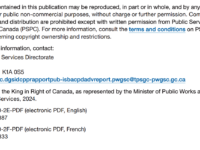
Fair Dealing by Giulia Forsythe (CC BY-NC-SA 2.0) https://flic.kr/p/dRkXwP
Copyright
AI Spending is Not an AI Strategy: Why the Government’s Artificial Intelligence Plan Avoids the Hard Governance Questions
The government announced plans over the weekend to spend billions of dollars to support artificial intelligence. Billed as “securing Canada’s AI Advantage”, the plan includes promises to spend $2 billion on an AI Compute Access Fund and a Canadian AI Sovereign Compute Strategy that is focused on developing domestic computing infrastructure. In addition, there is $200 million for AI startups, $100 million for AI adoption, $50 million for skills training (particularly those in the creative sector), $50 million for an AI Safety Institute, and $5.1 million to support the Office of the AI and Data Commissioner, which would be created by Bill C-27. While the plan received unsurprising applause from AI institutes that have been lobbying for the money, I have my doubts. There is unquestionably a need to address AI policy, but this approach appears to paper over hard questions about AI governance and regulation. The money may be useful – though given the massive private sector investment in the space right now a better case for public money is needed – but tossing millions at each issue is not the equivalent of grappling with AI safety, copyright or regulatory challenges.
The Law Bytes Podcast, Episode 194: CCH Turns 20 – Scott Jolliffe Goes Behind the Scenes of the Landmark Copyright Case That Ushered in Users’ Rights
Twenty years ago today the Supreme Court of Canada released CCH Canadian v. Law Society of Upper Canada, a decision that stands as perhaps the most consequential in Canadian copyright law history as it would firmly establish fair dealing as a users right and serve as the foundation for copyright law in Canada for decades to come. Leading off the hearing several months earlier for the Law Society was Scott Joliffe, an IP litigator with the law firm Gowlings. Joliffe was charged with arguing the fair dealing aspects of the case, but it was only at last moment that users right entered the picture. To mark its 20th anniversary, Joliffe joins the Law Bytes podcast to talk about the CCH case, his strategy and insights from the hearing, and his thoughts on its impact many years later.
Bid to End Crown Copyright is Back: MP Brian Masse’s Bill C-374 Would Remove Copyright from Government Works
Crown copyright, which grants the government exclusive copyright in any any work that is, or has been, prepared or published by or under the direction or control, has long been the focus on copyright and open government advocates who have called for its elimination. Under the current system of crown copyright that dates back for decades, government departments can use copyright to limit the publication or distribution of public works. While the government moved away from paid licensing to a non-commercial licence in 2010, commercial uses are still subject to permission and licence. The issue was one of the most controversial at the 2019 copyright review with the committee split on the issue: the government supported the creation of an open licence, while both the Conservatives and NDP backed its elimination altogether.
While debate over crown copyright continues (this 2019 Law Bytes podcast episode with Amanda Wakaruk and Jeremy de Beer focused on it), NDP MP Brian Masse has been a consistent advocate in favour of its elimination. There have been bills to eliminate crown copyright that date back to the 1990s, but Masse has introduced several crown copyright bills in recent years. Last week, he did it again with Bill C-374.
The House of Cards Crumbles: Why the Bell Media Layoffs and Government’s Failed Media Policy are Connected
Bell’s announcement this week that it is laying off thousands of workers – including nearly 500 Bell Media employees – has sparked political outrage with Prime Minister Justin Trudeau characterizing it as a “garbage decision.” The job losses are obviously brutal for those directly affected and it would be silly to claim that a single policy response was responsible. Yet to suggest that the government’s media policy, particularly Bills C-11 and C-18, played no role is to ignore the reality of a failed approach for which there have been blinking warning signs for years. Indeed, Trudeau’s anger (which felt a bit like a reprise of his Meta comments over the summer) may partly reflect frustration that his policy choices have not only not worked, but have made matters worse.
Canadian Copyright in the Age of Generative AI: My Submission to the Government’s Copyright Consultation
The government’s consultation on copyright and generative AI closed last week. The submissions are not yet public, but I am pleased to post my submission, which focused on an exception for text and data mining, the inclusion of copyrighted works in large language models, and the copyright implications of outputs from generative AI systems. My submission noted that the consultation raises several questions related to generative AI and copyright. I focused on three:
(1) Should Canada proceed with a text and data mining exception as recommended in the 2019 Copyright Act review?
(2) Should Canada introduce legislative reforms to address the use of copyright works in large language models (LLMs) that are central to the development of generative AI technologies?
(3) Should Canada introduce legislative reforms to address copyright-related questions arising from the outputs of generative AI systems?











